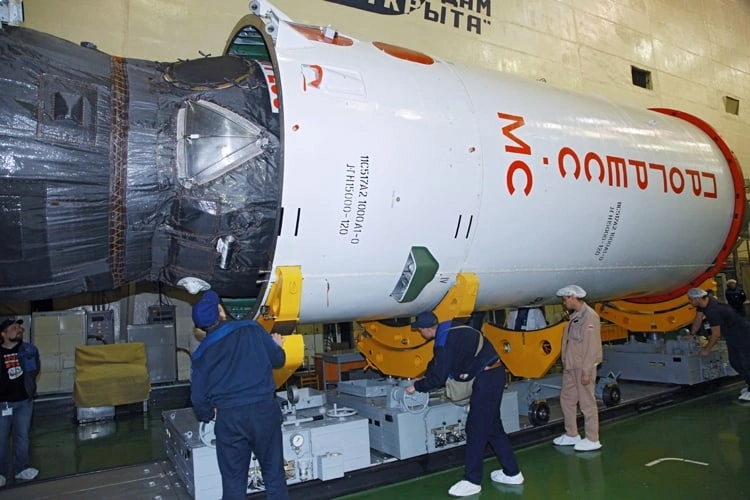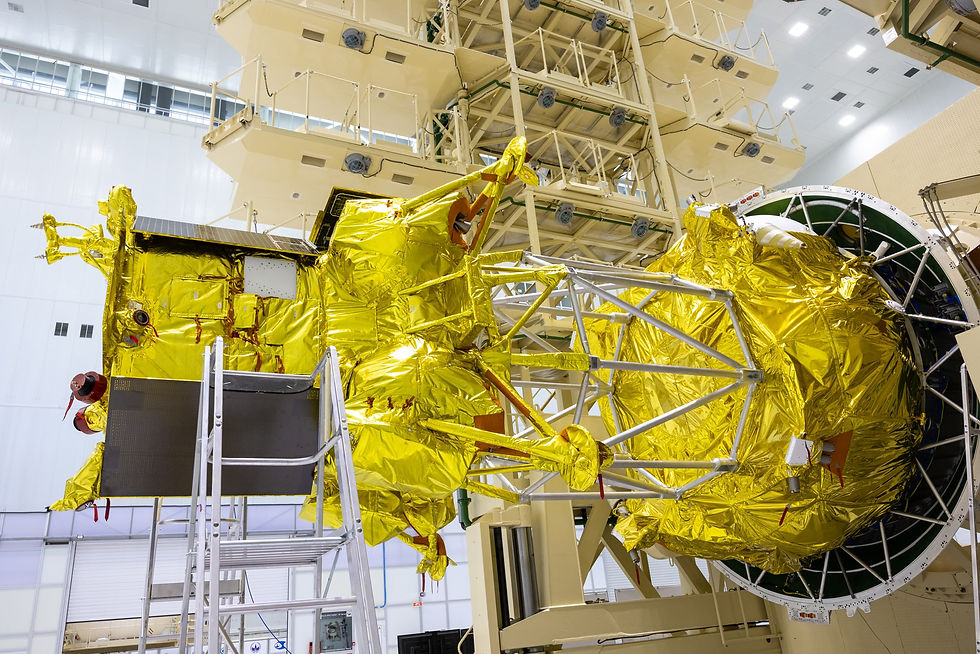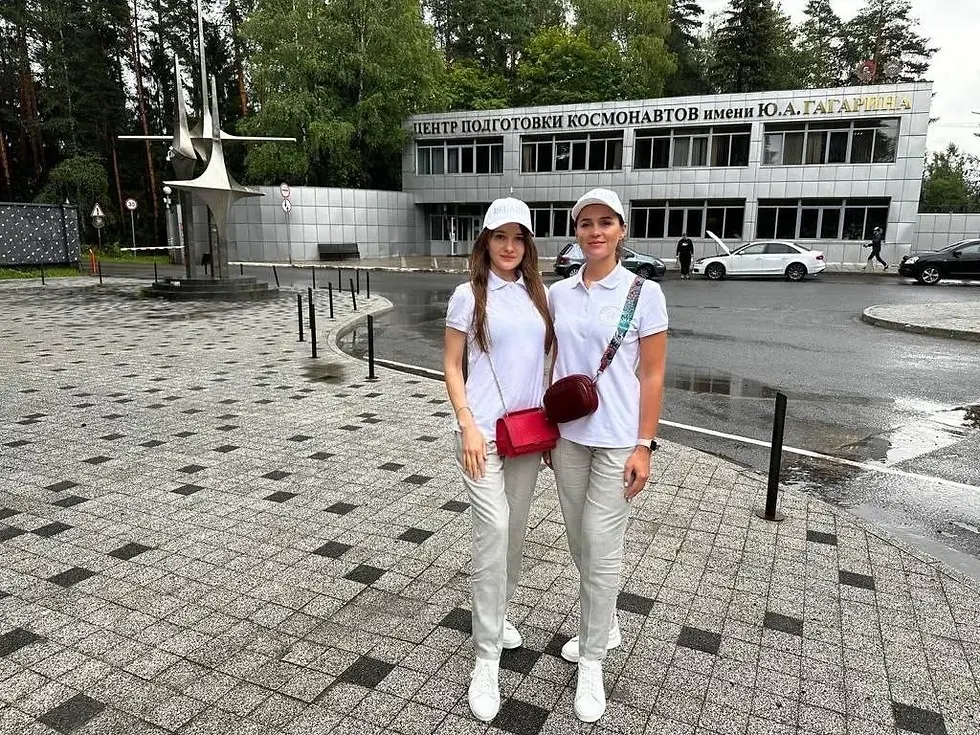Progress MS-20 to be launched to the ISS in June 1st week
- Karthik Naren
- May 30, 2022
- 3 min read
Updated: Jun 3, 2022
The Russian cargo ship will carry propellant and supplies and a 3D-Printer to the Exp-67 crew of ISS, on its 81st supply mission to space

The launch of the Soyuz-2.1a (serial no; S15000-052) carrier rocket with the Progress MS-20 spacecraft is scheduled for June 3, 2022 at 09:32:59 UTC.
The spacecraft flight program provides for an ultra-fast two-orbit autonomous rendezvous scheme with the delivery to the ISS of about 2,500 kg of cargo, including refueling fuel, supplies of drinking water and compressed gases, as well as 1,458 kg of various equipment and materials for the crew of the 67th long-term expedition.
The launch vehicle Soyuz-2.1a No. C15000-052 with the Progress MS-20 cargo spacecraft (No. 450) has been installed on the launch pad No. 31 (Vostok) of the Baikonur Cosmodrome, the press service of Roscosmos reports. Work began on the schedule of the first launch day.

Onboard, the Progress MS-20 Contains a list of Items to deliver for the Ongoing expedition;
RKK Energiya has developed a 3D printer for the ISS
RKK Energiya named after S.P. Korolev (part of the Roscosmos State Corporation), together with Tomsk Polytechnic University and Tomsk State University, have developed a 3D printer for use in the Orbital Laboratory.
Using a thermoplastic polymer printer, samples and parts that are used in large quantities on board the station will be printed by layer-by-layer application of a molten polymer thread (filament).
The resulting 3D printing samples will be returned to Earth to study the mechanical characteristics of products made using additive technologies (layer-by-layer growth and synthesis of objects). This will allow a comprehensive study of the impact of microgravity on 3D printing.
The first to work with a 3D printer will be the crew of the ISS-67 expedition — Roscosmos cosmonauts Oleg Artemyev, Denis Matveev and Sergey Korsakov. The 3D printer is scheduled to be delivered to the Russian segment of the ISS on the Progress MS-20. Over time, the device can become part of the station's standard equipment for upcoming missions.
The development of additive technologies at the station will open up new opportunities for domestic astronautics to use 3D printing in the future. For example, in lunar expeditions, astronauts will no longer depend on the delivery of the necessary components and structures on transport ships from the Earth, but will be able to print them directly in space, which will allow reaching a new level of performing various kinds of tasks.
Essential Resupplies: Canned Foods & Fuel

The spacecraft will carry 160 basic rations in 30 containers.
Platform rations will include canned, freeze-dried, and natural products, juices and jellies.
Astronauts will receive canned azu, beluga, sturgeon, crushed blueberries, beef and pork goulash, eggplant caviar, amateur caviar, chicken with nutmeg, chicken omelet, chakhokhbili and beef tongue in jam with olives.
Various soups will be transported in sublimated form.
This includes borscht with smoked meats, borscht with meat, pickles with meat, shurpa with noodles, vermicelli soup with meat, green and red lentil soups with meat, mushroom soup, peasant soup, plus peas, vegetables and pumpkin soups.
As a second course, astronauts will be able to choose from assorted vegetables, boiled eggplant, homemade or Russian beef, omelets with broccoli, mushrooms or vegetables, pork with milk, green bean and beet salads.
The cargo also includes cream cheese and chocolate, dried apricot puree, apple dessert, curd with hawthorn puree, curd with walnuts and curd with currant puree.
The varied juices will be represented by apricot, grape-plum, peach-apricot, peach-currant, apple-apricot and apple-peach.
Among the drinks will be cocoa with milk and sugar, cranberry, apple-blueberry and apple-cherry jam.
Russian cosmonauts also ordered canned fish, fried cheese with tomato sauce, cheese in jam, pizhyan in jam and mixture of fish and vegetables, as well as pike with beets in tomato sauce and pike in tomato sauce with wine and plums.
In addition, the crew's "special order" includes strawberry, pear, blueberry and raspberry yogurts, Mars and Snickers chocolate bars, M&M's candy, condensed milk, Rossiya dark chocolate, as well as Forest Tale and Northern Cherry drinks.
In addition, in the spacecraft's cargo bay there are four cubesat-class microsatellites:

The Tsiolkovsky-Ryazan No. 1-2 and the YuZGU-55 No. 11-12, developed by students from Ryazan University of Radio Engineering and University of Southwest Kursk under the
The next batch of Cubesats to be launched by Russian cosmonauts from the ISS is expected to complete the formation of an autonomous constellation of orbiting university satellites under the program of the fifth stage of the Radioscaf scientific and educational space experiment.










































Comments